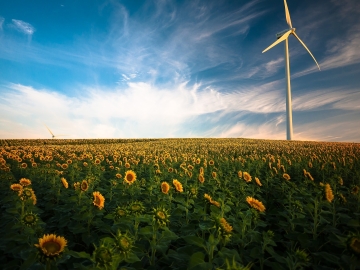Artificial intelligence can make wind energy cheaper

Deploying artificial intelligence could allow wind turbines to work in a smarter way with environmental factors. The doctoral study of VUB researcher Timothy Verstraeten shows that wind energy can become cheaper and more efficient this way.
Deploying artificial intelligence could allow wind turbines to work in a smarter way with environmental factors. The doctoral study of VUB researcher Timothy Verstraeten shows that wind energy can become cheaper and more efficient this way.
Deploying artificial intelligence could allow wind turbines to work in a smarter way with environmental factors. The doctoral study of VUB researcher Timothy Verstraeten shows that wind energy can become cheaper and more efficient this way.
Environmental factors such as wind speed, wind direction or temperature constantly influence the operation of a wind turbine. This makes it difficult, even for experts, to fully and correctly map out the condition of a turbine. Verstraeten has now shown that artificial intelligence (AI) can help here.
The automatic processes AI unleashes on the condition of turbines can map how they relate to each other and when they are working well or poorly within the wind farm system. That "health check" can uncover complex relationships that can eventually reduce maintenance costs and also increase efficiency.
"There is great potential for wind turbines to interact more intelligently with their environment and with each other via AI," said the VUB researcher.
For his research, Verstraeten first had the wind turbines share information about their personal state with each other. Afterwards, the AI was used to get a global picture of how the wind turbines depend on each other. For example, a turbine at the front of the farm that is rotating leaves a slowed and turbulent wind flow behind it. This causes the turbines at the back of the farm to produce less energy. Using AI, the control system mitigates this kind of production loss across the entire wind farm.
Latest insights & stories

A Global Movement: The World Unites in a Pink Pledge for Clean and Sustainable Water
5,000 participants. 32 countries. €30,000 funds raised. And that's just the beginning.
Picture this: One step that sends ripples across the globe, transforming lives and creating waves of change. You might wonder, how can such a simple action for most of us have such a profound impact?

Sustainability and circularity in construction
Join us in transforming the future of construction, creating buildings that not only stand the test of time but also contribute to a healthier planet!

RainTunes: Shower scenarios for the soul
Light, hearing, smell, and touch: Together with experts, we have developed sensuous scenarios that turn showering into an individual experience. Whether you want to prepare for the day ahead or relax after working out. Whether you want to refresh after a day’s work or unwind at the end of the evening: RainTunes surprises with multisensory experiences.*
*Currently available only in Germany and Austria.